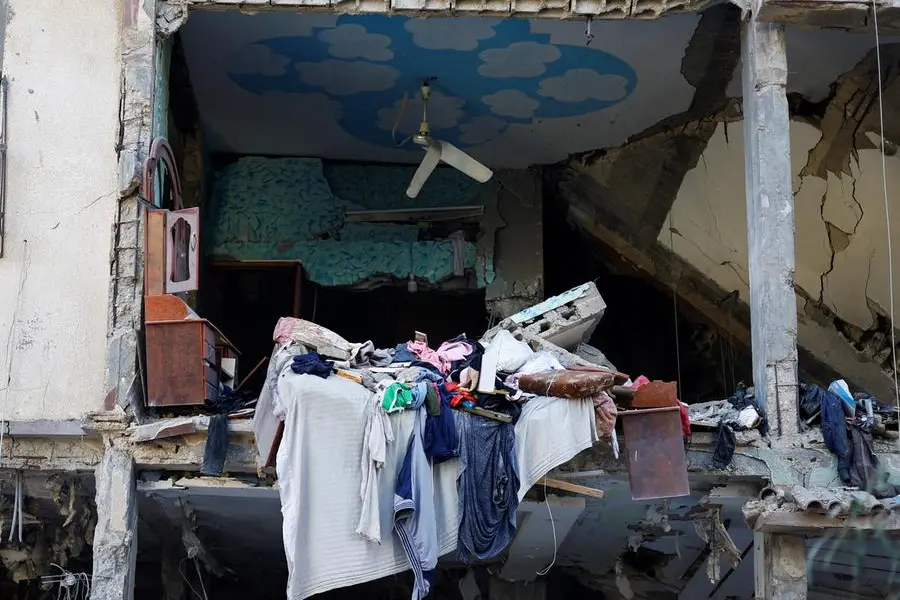PHOTO
GAZA/JERUSALEM - Israel kept up heavy bombardment of targets throughout Gaza overnight on Saturday after Prime Minister Benjamin Netanyahu vowed to "fight until victory" following the release of the first two hostages by the enclave's ruling Hamas group.
After Netanyahu signalled no pause in Israel's aerial onslaught and expected ground invasion, its military said fighter jets had struck a "large number of Hamas terror targets throughout the Gaza Strip" including command centres and combat positions inside multi-story buildings.
Palestinian media said Israeli aircraft had struck six homes in the north of Gaza, a coastal enclave that is one of the world's most densely populated places, killing at least 19 people and injuring dozens.
The Israeli military reported a fresh salvo of rockets from Gaza against southern Israeli border communities before dawn, then a lull until sirens sounded in the port city of Ashdod some 40 km (25 miles) north of the Palestinian enclave. There was no immediate word of casualties in either incident.
Hamas on Friday freed Americans Judith Tai Raanan, 59, and her daughter Natalie, 17, who were among around 200 kidnapped in its Oct. 7 cross-border attack on southern Israel by militants of the Islamist movement.
An image obtained by Reuters after their release showed the two women flanked by three Israeli soldiers and holding hands with Gal Hirsch, Israel's coordinator for the captives and missing.
Reached by phone in Bannockburn, Illinois, outside Chicago, Uri Raanan, the teenager's father, said he spoke with his daughter by phone. "She sounds very, very good, very happy - and she looks good."
They were the first hostages confirmed by both sides in the conflict to be freed since Hamas gunmen burst into Israel and killed 1,400 people, mainly civilians, in the deadliest single attack on Israelis since the country's founding 75 years ago.
Gaza's Health Ministry says Israel's retaliatory air and missile strikes have killed at least 4,137 Palestinians, including hundreds of children, while over a million of the besieged territory's 2.3 million people have been displaced.
Israel has amassed tanks and troops near the fenced border around the small coastal enclave for a planned ground invasion with the objective of annihilating Hamas, after several inconclusive wars dating to its 2007 seizure of power in Gaza.
"Two of our abductees are at home. We are not giving up on the effort to return all abducted and missing people," Netanyahu said in a statement released late Friday night.
"At the same time, we'll continue to fight until victory."
Abu Ubaida, a spokesperson for Hamas' armed wing, said the hostages were released in part "for humanitarian reasons" in response to Qatari mediation efforts.
Israeli Defence Minister Yoav Gallant said achieving Israel's objectives would not be quick or easy.
"We will topple the Hamas organisation. We will destroy its military and governing infrastructure. It's a phase that will not be easy. It will have a price," Gallant told a parliamentary committee.
He added that the subsequent phase would be more drawn out, but was aimed at achieving "a completely different security situation" with no threat to Israel from Gaza. "It's not a day, it's not a week, and unfortunately it's not a month," he said.
HEAVY BOMBARDMENT
The Orthodox Patriarchate of Jerusalem, the main Palestinian Christian denomination, said that Israeli forces had struck the Church of Saint Porphyrius in Gaza City, where hundreds of Christians and Muslims had sought refuge.
The Israeli military said part of the church was damaged in a strike on a nearby militant command centre.
Israel has already told all civilians to evacuate the northern half of the Gaza Strip, which includes Gaza City. Many people have yet to leave saying they fear losing everything and have nowhere safe to go with southern areas also under attack.
Asked if Israel had so far followed the laws of war in its response, U.S. Secretary of State Antony Blinken reiterated on Friday that Israel had the right to defend itself and make sure Iran-backed Hamas was not able to launch attacks again.
"It's important that operations be conducted in accordance with international law, humanitarian law, the law of war," he said.
The United Nations humanitarian affairs office said more than 140,000 homes - nearly a third of all homes in Gaza - had been damaged, with nearly 13,000 completely destroyed.
International attention has focused on getting aid to Gaza through the one access point not controlled by Israel, the Rafah crossing to Egypt.
Biden, who visited Israel on Wednesday, said he believed trucks carrying aid would get through in the next 24-48 hours.
U.N. Secretary-General Antonio Guterres toured the checkpoint on Egypt's side on Friday and called for a meaningful number of trucks to enter Gaza daily, and checks - which Israel insists on to stop aid reaching Hamas - to be quick and pragmatic.
Western leaders have so far mostly offered support to Israel's campaign against Hamas, although there is mounting unease about the plight of civilians in Gaza.
Many Muslim states, however, have called for an immediate ceasefire, and protests demanding an end to the bombardment were held in cities across the Islamic world on Friday.
In the Israeli-occupied West Bank, where violence has escalated since Israel began bombarding Gaza, Israeli troops shot dead a Palestinian teenager during clashes near the city of Jericho.
Since the Israel-Hamas war erupted, the borderlands between south Lebanon and northern Israel have also seen constant but so far limited clashes between the Israeli military and fighters from the Lebanese Shi'ite Islamist group Hezbollah.
The Israeli military said on Saturday a soldier had been killed by a missile attack on the Lebanese border, in a statement that did not elaborate on the exact time or location.
(Reporting by Nandita Bose in Washington and Nidal al-Mughrabi in Gaza, and the Washington and Jerusalem Bureaus; Writing by Idrees Ali and Stephen Coates; editing by Lincoln Feast and Mark Heinrich)





















